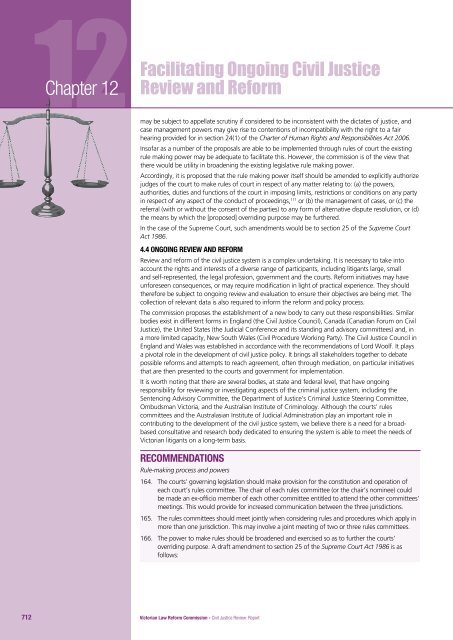12Facilitating Ongoing Civil Justice Review and Reform
12Facilitating Ongoing Civil Justice Review and Reform
12Facilitating Ongoing Civil Justice Review and Reform
You also want an ePaper? Increase the reach of your titles
YUMPU automatically turns print PDFs into web optimized ePapers that Google loves.
Chapter 12<br />
Facilitating <strong>Ongoing</strong> <strong>Civil</strong> <strong>Justice</strong><br />
<strong>Review</strong> <strong>and</strong> <strong>Reform</strong><br />
may be subject to appellate scrutiny if considered to be inconsistent with the dictates of justice, <strong>and</strong><br />
case management powers may give rise to contentions of incompatibility with the right to a fair<br />
hearing provided for in section 24(1) of the Charter of Human Rights <strong>and</strong> Responsibilities Act 2006.<br />
Insofar as a number of the proposals are able to be implemented through rules of court the existing<br />
rule making power may be adequate to facilitate this. However, the commission is of the view that<br />
there would be utility in broadening the existing legislative rule making power.<br />
Accordingly, it is proposed that the rule making power itself should be amended to explicitly authorize<br />
judges of the court to make rules of court in respect of any matter relating to: (a) the powers,<br />
authorities, duties <strong>and</strong> functions of the court in imposing limits, restrictions or conditions on any party<br />
in respect of any aspect of the conduct of proceedings, 111 or (b) the management of cases, or (c) the<br />
referral (with or without the consent of the parties) to any form of alternative dispute resolution, or (d)<br />
the means by which the [proposed] overriding purpose may be furthered.<br />
In the case of the Supreme Court, such amendments would be to section 25 of the Supreme Court<br />
Act 1986.<br />
4.4 <strong>Ongoing</strong> review <strong>and</strong> reform<br />
<strong>Review</strong> <strong>and</strong> reform of the civil justice system is a complex undertaking. It is necessary to take into<br />
account the rights <strong>and</strong> interests of a diverse range of participants, including litigants large, small<br />
<strong>and</strong> self-represented, the legal profession, government <strong>and</strong> the courts. <strong>Reform</strong> initiatives may have<br />
unforeseen consequences, or may require modification in light of practical experience. They should<br />
therefore be subject to ongoing review <strong>and</strong> evaluation to ensure their objectives are being met. The<br />
collection of relevant data is also required to inform the reform <strong>and</strong> policy process.<br />
The commission proposes the establishment of a new body to carry out these responsibilities. Similar<br />
bodies exist in different forms in Engl<strong>and</strong> (the <strong>Civil</strong> <strong>Justice</strong> Council), Canada (Canadian Forum on <strong>Civil</strong><br />
<strong>Justice</strong>), the United States (the Judicial Conference <strong>and</strong> its st<strong>and</strong>ing <strong>and</strong> advisory committees) <strong>and</strong>, in<br />
a more limited capacity, New South Wales (<strong>Civil</strong> Procedure Working Party). The <strong>Civil</strong> <strong>Justice</strong> Council in<br />
Engl<strong>and</strong> <strong>and</strong> Wales was established in accordance with the recommendations of Lord Woolf. It plays<br />
a pivotal role in the development of civil justice policy. It brings all stakeholders together to debate<br />
possible reforms <strong>and</strong> attempts to reach agreement, often through mediation, on particular initiatives<br />
that are then presented to the courts <strong>and</strong> government for implementation.<br />
It is worth noting that there are several bodies, at state <strong>and</strong> federal level, that have ongoing<br />
responsibility for reviewing or investigating aspects of the criminal justice system, including the<br />
Sentencing Advisory Committee, the Department of <strong>Justice</strong>’s Criminal <strong>Justice</strong> Steering Committee,<br />
Ombudsman Victoria, <strong>and</strong> the Australian Institute of Criminology. Although the courts’ rules<br />
committees <strong>and</strong> the Australasian Institute of Judicial Administration play an important role in<br />
contributing to the development of the civil justice system, we believe there is a need for a broadbased<br />
consultative <strong>and</strong> research body dedicated to ensuring the system is able to meet the needs of<br />
Victorian litigants on a long-term basis.<br />
Recommendations<br />
Rule-making process <strong>and</strong> powers<br />
164. The courts’ governing legislation should make provision for the constitution <strong>and</strong> operation of<br />
each court’s rules committee. The chair of each rules committee (or the chair’s nominee) could<br />
be made an ex-officio member of each other committee entitled to attend the other committees’<br />
meetings. This would provide for increased communication between the three jurisdictions.<br />
165. The rules committees should meet jointly when considering rules <strong>and</strong> procedures which apply in<br />
more than one jurisdiction. This may involve a joint meeting of two or three rules committees.<br />
166. The power to make rules should be broadened <strong>and</strong> exercised so as to further the courts’<br />
overriding purpose. A draft amendment to section 25 of the Supreme Court Act 1986 is as<br />
follows:<br />
712<br />
Victorian Law <strong>Reform</strong> Commission - <strong>Civil</strong> <strong>Justice</strong> <strong>Review</strong>: Report
















